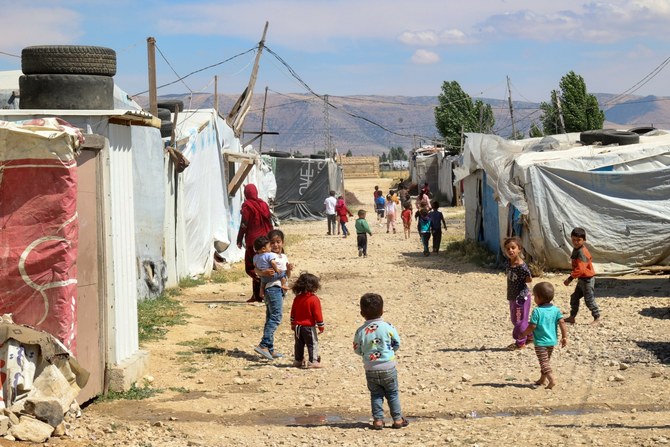Urgent action needed to address the plight of Syrian refugees in Lebanon

https://arab.news/wvzsf
When the Syrian war erupted in 2011, international aid poured in and countries opened their doors to support people affected by the conflict. Yet, more than 12 years later, the plight of Syrian refugees in Lebanon is mired in uncertainty as they face diminishing international funding, the looming threat of deportation and an increasingly precarious existence in a volatile host country. As the hardships of daily life increase for many Syrians in Lebanon, the situation needs renewed attention, commitment and action to find long-term solutions.
Following the outbreak of war in Syria, nearly 2 million people sought refuge in neighboring Lebanon, once a place of relative stability in a troubled region, but which is now grappling with skyrocketing inflation and currency depreciation that has pushed more than 80 percent of its population into poverty. And the people impacted hardest by Lebanon’s economic freefall are Syrian refugees.
Despite their initial hopes of finding stability and security in Lebanon, most Syrian families struggle to meet even their basic needs. One in nine rely on humanitarian assistance simply to survive. Meanwhile, international funding allocated to Syrian refugees in Lebanon has steadily dwindled. This is evident in all aspects of their daily lives, with serious consequences for their health and well-being. Shrinking supplies of clean water only months before last year’s cholera outbreak is just an example. Deteriorating living conditions have led to our teams treating alarming numbers of people for skin infections since the beginning of the year.
Those Syrians who need medical care have found the support available to them has significantly diminished. Earlier this year, the UN High Commissioner for Refugees announced a reduction of secondary healthcare coverage to just 50 percent for maternal care and placed a cap on other lifesaving hospitalization coverages. Other actors that provide healthcare, both national and international organizations, have scaled down their services or closed them completely. Alarmingly, Syrians who have not approached UNHCR for registration are no longer eligible for any medical expense coverage. Notably, since 2015, the government has limited UNHCR from registering any refugees. This essentially leaves Syrians who entered Lebanon after 2015 without full access to services and protection.
Lebanon’s deteriorating economic situation has been accompanied by a steady rise in anti-refugee rhetoric
Ana Paula Berlin
At the same time, Lebanon’s deteriorating economic situation has been accompanied by a steady rise in anti-refugee rhetoric. Before the economic crisis, Lebanese politicians used Syrian refugees to secure continuous funding from international donors and the world community. But with international funding shrinking, there has been a shift in narrative: The government is now proposing to repatriate thousands of refugees to Syria, with or without their consent, with hundreds already sent back between May and April of this year.
When overlapping crises occur simultaneously, a disturbing pattern emerges: Rather than addressing the root causes of economic and social problems, the blame is placed on refugees, who are portrayed as a drain on resources or a threat to jobs and security. Lebanon is no exception to this scapegoating trend. New discriminatory laws, increased surveillance, a lack of access to basic services and limited capacity to exercise human rights have become commonplace.
As a result, Syrian refugees face severe difficulties on all fronts — diminishing humanitarian aid, the threat of deportation and an increasingly uncertain position in a volatile host country. Their situation is a perfect illustration of the shortfalls of the international community’s approach to crises. All too often it fails to provide comprehensive and sustainable solutions, instead focusing on ad hoc aid approaches that fail the most vulnerable people when new geopolitical and economic environments develop.
While immediate assistance in the form of food, shelter and medical aid plays a vital role in saving lives during an emergency, long-term planning and sustainable interventions in cases of protracted crisis allow communities to rebuild their lives and break free from the cycle of displacement, poverty and uncertainty.
Their situation is a perfect illustration of the shortfalls of the international community’s approach to crises
Ana Paula Berlin
The situation and living conditions of Syrian refugees in Lebanon demand renewed attention and action from the international community. Their suffering did not end with their initial displacement — and this should be acknowledged. Most importantly, international organizations working in Lebanon have a responsibility to home in on dedicated needs assessments, restructure their programming, reevaluate the impact of their activities and push for more efficient coordination. A shift is necessary to address this forgotten crisis and support sustainable solutions that prioritize the well-being and protection of all those who have been forced to flee their homes.
As we witness glimmers of hope that the situation in Syria may begin to improve, we must ensure that Syrian refugees are not left behind while the world moves on.
While the focus here has been on the struggles encountered by Syrian refugees in Lebanon, it is essential to acknowledge that they represent only a portion (about 20 percent) of the overall 6.8 million Syrian refugees dispersed globally, alongside 6.9 million internally displaced individuals. On World Refugee Day, Medecins Sans Frontieres’ intention is to highlight the particular needs of the Syrian population due to the recent developments in Lebanon, without undermining the plight of refugees in other locations; which all necessitate a renewed commitment to the topic. The Lebanese perspective is framed within my personal encounters and perspective.
- Ana Paula Berlin is advocacy manager for Medecins Sans Frontieres.











































